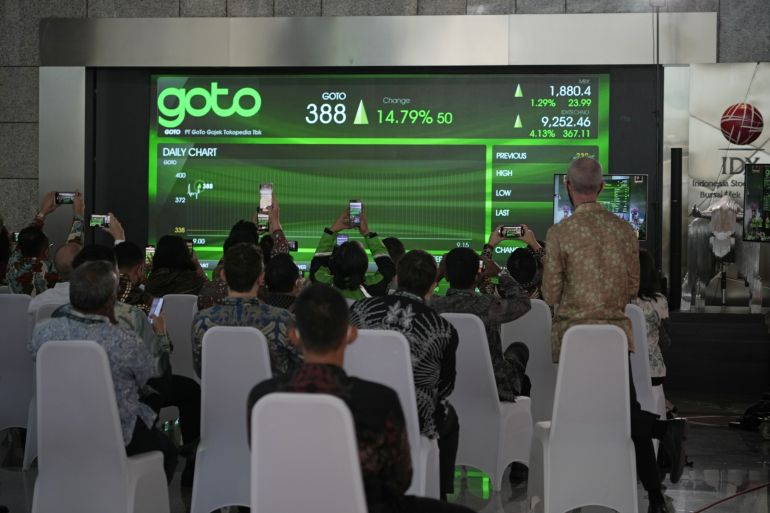Jakarta, Indonesia – Indonesia’s temporary ban on major websites including PayPal exposed Jakarta’s difficult balancing act as it seeks to strengthen its grip on the internet and become Southeast Asia’s next tech hub.
Indonesian President Joko “Jokowi” Widodo has listed digital infrastructure as a priority in his Indonesia 4.0 roadmap, which aims to position his country among the top 10 economies.
But with Widodo driving the digital economy and overseeing Indonesia’s growth to become Southeast Asia’s second-largest recipient of venture capital and home to 13 tech startups valued at more than $1 billion, the administration has tried to rein in the influence of internet companies. The population of the country is more than 270 million.
Those efforts include the introduction of a licensing system that the government says is necessary to strengthen data protection and facilitate the removal of content that “could undermine public order” in the islands. By 2025, the value of the digital economy could more than double to $146 billion.
On Saturday, PayPal, Yahoo and several gaming platforms were temporarily shut down after failing to sign up for the licensing system, causing confusion and anger among site users.
“In the morning, I saw that the ministry banned PayPal,” Jati Andito, 34, a freelance voice actress in Jakarta, told Al Jazeera.
“The marketplace has a partnership with PayPal. If I don’t use PayPal, they won’t recommend my services.”
On Tuesday, Indonesia’s Ministry of Communications and Information Technology restored access to Yahoo and gaming site Steam after they joined the framework past the original deadline. The ministry, which earlier defended the system as necessary to “protect and strengthen governance of Indonesia’s digital space”, temporarily suspended PayPal payments to allow the company to register until Friday. The Epic Games Store and EA Origins remained suspended until Tuesday.
PayPal said Wednesday that it was registered with the system and that customers could send and receive money as usual.
“PayPal is fully committed to complying with applicable laws and regulations in the markets in which we do business,” a spokesperson said.
While access to the sites was eventually restored, the incident raised questions about how welcoming Indonesia’s regulatory environment is to tech companies, especially those from overseas.
Bhima Yudhistira Adhinegara, director of the Jakarta-based Center for Economic and Legal Research, said the temporary bans are “very bad” news for the country’s tech scene, especially the gaming industry, worth $1.6bn last year.
“There is a link between unclear laws and Indonesia’s low attractiveness for foreign investments,” Adinigara told Al Jazeera.
“Who wants to invest billions of dollars in a local gaming company, for example, if you simply block them? Indeed, this is a bad precedent.”
Adhingara mentioned that Indonesia ranked 47th for business law and 38th for foreign investment in the IMD World Competitiveness Ranking 2022.
Release slowly
Pingkan Audrin, a researcher at the Indonesian Policy Research Center, said some of the obligations included in the framework are difficult and “very problematic”.
Audreen told Al Jazeera, “There are a set of obligations that you have to meet after you sign up, such as content moderation, data management, privacy, etc.”
Others say that the government’s efforts to increase the control of the sector are not correct in principle.
Joel Shen, head of Asia technology at international law firm Wiers, said officials had created confusion and skepticism by supporting the ban, despite broad support for the government’s regulatory reforms.
“By going back from its original position, Cominfo has not only put itself in an awkward position, but also created this uncertainty in the market… Cominfo has called into question the rationality of the rules,” Shen said, citing the ministry on behalf of Indonesia. .
“The foreign trade and investment community has a heightened perception of Indonesian regulators…Indonesian regulators are unpredictable and inconsistent in enforcing regulations.”
Coalition Advocacy Permenkominfo 5/2020 advocacy group representative Ariehta Eleson Sembiring said the licensing system was slow, and it took more than a year for the companies’ registration platform to go online.
“This delay shows the ministry’s lack of good governance,” Sembring told Al Jazeera.
It contradicts President Joko Widodo’s vision to accelerate the digitization of the industry.

For some observers, however, Jakarta’s more pragmatic approach is both welcome and long overdue.
Glenn Wijaya, a partner at Jakarta-based law firm Christian Teo & Partners, said the government’s tough stance on tech firms would benefit consumers and businesses.
Consumers say their dealings with government-registered companies will be safer, and companies will have easier access to authorities to resolve issues such as data breach attempts and law enforcement inquiries.
“If something bad happens, the ministry knows exactly who to contact,” Wijaya told Al Jazeera.
Wijaya dismissed concerns that the government is accessing the public’s personal data even though the country does not have a specific privacy law.
“As of June 2020, there were more than 40 laws or regulations governing the protection of personal information in Indonesia,” he said.




